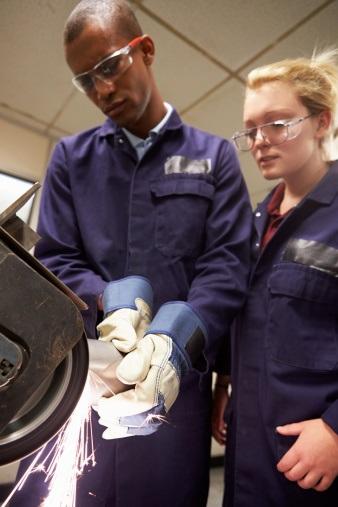Senior Editor
- FMA
- The Fabricator
- FABTECH
- Canadian Metalworking
Categories
- Additive Manufacturing
- Aluminum Welding
- Arc Welding
- Assembly and Joining
- Automation and Robotics
- Bending and Forming
- Consumables
- Cutting and Weld Prep
- Electric Vehicles
- En Español
- Finishing
- Hydroforming
- Laser Cutting
- Laser Welding
- Machining
- Manufacturing Software
- Materials Handling
- Metals/Materials
- Oxyfuel Cutting
- Plasma Cutting
- Power Tools
- Punching and Other Holemaking
- Roll Forming
- Safety
- Sawing
- Shearing
- Shop Management
- Testing and Measuring
- Tube and Pipe Fabrication
- Tube and Pipe Production
- Waterjet Cutting
Industry Directory
Webcasts
Podcasts
FAB 40
Advertise
Subscribe
Account Login
Search
Apprenticeship programs: Getting paid to learn
A healthy transition to a lifetime of workplace engagement
- By Tim Heston
- December 11, 2017

Manufacturing apprenticeships provide a solid link between industry and education that is so desperately needed.
Apprenticeship program—a normal part of growing up in much of Europe, a relative rarity in the U.S.—recently received a well-deserved boost in positive press. Vox described what many in metal fabrication have known for years: that this is a new age of manufacturing, that workers need a mix of technical skills, and that factory work isn’t as dangerous and dirty as it once was.
The FABRICATOR has covered apprenticeship programs before, including one cover story several years ago about a program at a North Carolina metal manufacturer. It’s just one example of how fabricators have ramped up their in-house training programs. The whole idea is simple: Sure, in an ideal world, schools would churn out a plethora of quality candidates, but they don’t, so fabricators have no choice but to step up and provide training. And there’s always a risk that trained workers could jump ship, but what choice do fabricators have? Besides, high turnover of good, freshly trained entry-level workers may point to other workplace problems.
Even if schools did churn out qualified worker after qualified worker, I still think apprenticeships and other in-house training programs would be vital. When I talk to technical school teachers, they all tell me the same thing: Even the best school programs can prepare people only to a certain level. The best employers in manufacturing bring entry level workers to the next level through robust in-house training.
What sets apprenticeship programs apart is that they provide a solid link between industry and education that we so desperately need. There’s nothing quite like the experience of producing products that will actually be sold and used. Most significant, the apprenticeship provides a good transition from the “education world” to the “real world.”
Many in previous generations went to college to, in effect, learn to think. Chris Kuehl, economic analyst for the Fabricators & Manufacturers Association Intl., has said as much at several FMA events. In a previous life, Kuehl was a professor of economics and, as such, sometimes advised students that the major they chose wasn’t all that important. They were in college to learn to think.
This promoted the idea of the “college experience,” one that was very much different than the rest of life. Sure, they learned to think, travel, and do, well, other things, but after college they could bounce around and find a job that fit, depending on where the winds of life took them. Times were different. The U.S. had fewer college graduates overall, and there was a kind of romanticized decoupling between college life and real life. it’s one that now really doesn’t add value to much of the U.S. economy.
Kuehl has conceded that he wouldn’t tell college advisees today that their major doesn’t matter. Industry needs people with direction, purpose, those who can absorb new technologies while appreciating and learning the intricacies of established methods. Apprenticeship, co-ops, internships that involve more than getting coffee—all of these methods and more can help people build the direction and purpose that industry needs.
subscribe now

The Fabricator is North America's leading magazine for the metal forming and fabricating industry. The magazine delivers the news, technical articles, and case histories that enable fabricators to do their jobs more efficiently. The Fabricator has served the industry since 1970.
start your free subscriptionAbout the Author

Tim Heston
2135 Point Blvd
Elgin, IL 60123
815-381-1314
Tim Heston, The Fabricator's senior editor, has covered the metal fabrication industry since 1998, starting his career at the American Welding Society's Welding Journal. Since then he has covered the full range of metal fabrication processes, from stamping, bending, and cutting to grinding and polishing. He joined The Fabricator's staff in October 2007.
Related Companies
- Stay connected from anywhere

Easily access valuable industry resources now with full access to the digital edition of The Fabricator.

Easily access valuable industry resources now with full access to the digital edition of The Welder.

Easily access valuable industry resources now with full access to the digital edition of The Tube and Pipe Journal.
- Podcasting
- Podcast:
- The Fabricator Podcast
- Published:
- 04/16/2024
- Running Time:
- 63:29
In this episode of The Fabricator Podcast, Caleb Chamberlain, co-founder and CEO of OSH Cut, discusses his company’s...
- Trending Articles
AI, machine learning, and the future of metal fabrication

Employee ownership: The best way to ensure engagement

Dynamic Metal blossoms with each passing year

Steel industry reacts to Nucor’s new weekly published HRC price

Metal fabrication management: A guide for new supervisors

- Industry Events
16th Annual Safety Conference
- April 30 - May 1, 2024
- Elgin,
Pipe and Tube Conference
- May 21 - 22, 2024
- Omaha, NE
World-Class Roll Forming Workshop
- June 5 - 6, 2024
- Louisville, KY
Advanced Laser Application Workshop
- June 25 - 27, 2024
- Novi, MI


























